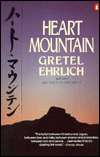February 19 is the anniversary of the day FDR signed Executive Order 9066 which took over 11,000 Japanese immigrants and Japanese-Americans from their homes and businesses and sent them to concentration camps for the duration of WWII. One of those was the Heart Mountain Relocation Camp in Wyoming. Ehrlich’s novel is based on these true events. She imagines—based on her research—what life must have been like for those in the camp and those in the surrounding communities.
McKay is a young man whose ranch borders the camp. A serious injury from a “horse accident” prevented him from following his two older brothers into the military. Like Testament of Youth, this is a story of those who didn’t go to war. McKay is left to run the ranch with only the help of an older alcoholic cowboy named Pinkey and the long-time family cook, Bobby Korematsu. On the day his brothers leave, McKay sets up a cot on a screened porch and proceeds to sleep there through the blistering summers and harsh Wyoming winters.
Ehrlich brings her personal knowledge of ranching near Heart Mountain to make it all come alive, not just the way the grass looks in August or the river in flood, but the details of cow camps and moving the cattle when it snows, even the way the men and women talk to each other, a careful reticence masking deep emotion.
McKay rode out through the west pasture, roping, doctoring, and ear-tagging calves. He and his brothers had always loved these early spring days “when a man could get a rope down and let his horse run awhile.” When he finished, he rode to the river. Overhead the clouds looked more like waves, the kind of waves that come toward shore but never break, whose cresting swells suddenly flatten and return to deeper water. He thought he had reached the bottom of his loneliness, but now another depth revealed itself—one that he could not push beyond and as he approached the river, orange and scarlet clouds traveled over him without breaking.
I’m grateful to my friend Laura for recommending Ehrlich’s work.
The story also follows Kai Nakamura, a young graduate student from San Francisco who is swept up and deposited at the camp along with his parents, from whom he’d been estranged. The dislocation only tightens his parents’ grip on the old-fashioned ideas they brought with them from Japan, making Kai seek out others. In the camp he meets Mariko, a beautiful and outspoken artist newly returned from Paris, and her grandfather, Mr. Abe, a Noh mask carver who tries to teach Kai some of his zen habits.
The two groups are brought together when Bobby goes to the camp looking for relatives and later when McKay accidentally shoots Mr. Abe. It is this uneasy meeting ground, the space between the camp’s prisoners and the surrounding community that the novel explores, mostly by following McKay and Kai, but also through other inhabitants of both sides of the fence. While there is some intolerance, the characters we follow are thinking more deeply about what it means to be human and about what connects and separates us.
They stood in the V where two creeks met. A kingfisher, perched on a branch, dove into the water and came out again, as if untouched, unscathed. She looked at McKay. In his eyes, slabs of gray were cut into the blue. It’s the kind of imperfection Japanese love, a sign of beauty, she thought, smiling, and grabbed him around the waist.
“Your bones are so light. I always forget that,” he said, touching her wrist. “Like a bird’s.”
They heard flapping and laughed. Upstream and around a bend, a blue heron lifted into sight and flew behind a screen of willows.
Ehrlich uses every small moment, every brief image, every cloud and bird, to deepen her story and bring us more thoroughly into the hearts and minds of these brave, flawed people, thrown together by history and a disgraceful action by a government newly at war. FDR was persuaded by the mob’s fearful cries, but Ehrlich shows us, one person at a time, what happens when we see each other as individuals.
Have you read any other books about the relocation of Japanese immigrants and Japanese-Americans to camps during WWII?


[…] such as the war and the internment camps, too lightly. Having recently read Gretel Ehrlich’s Heart Mountain which beautifully explored the experience within and without such a camp, I felt let down by the […]